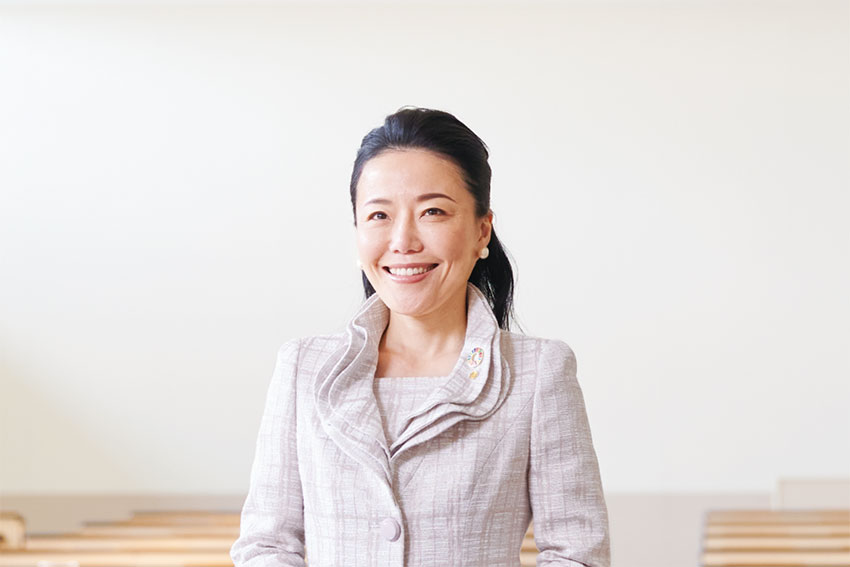Asuka Tsuzuki, President of Japan University of Economics, highlights the university's commitment to fostering international students with strong language skills, cultural understanding, and business acumen. By offering comprehensive support and a strong global network, the university is shaping graduates who can contribute to Japan’s workforce and strengthen global connections.

Today, Japan is confronted with a pressing series of challenges, such as a lack of labor force globalization and the nation's demographic shift. The Japanese government's initiative to attract 400,000 foreign students to Japan to revamp the education system is a crucial response. What role can universities play in addressing these urgent challenges, including the need to globalize and the shortage of labor?
For the past ten years, we have accepted foreign students with the idea of nurturing those foreign students into people who can contribute to Japanese society. We want them to merge into and become active in Japan. This, in particular, takes into account a future where there is a severe labor shortage due to demographic changes. While we do offer English programs, a large majority of our students are enrolled in Japanese-centric courses where they learn Japanese language, culture, and business so that they can easily adapt to Japanese society.
In our four-year program, we offer Japanese language and culture classes alongside specialist economics and management classes. With this acquired knowledge, foreign students can easily join Japanese companies. In fact, recently, we have seen Japanese companies become very proactive in hiring foreigners with high Japanese and English or other language skills. By enhancing both their Japanese language and practical business skills, international students can significantly contribute to alleviating labor shortages in Japan..

Shibuya campus
Japan is a very attractive location to study and is widely considered one of the safest countries in the world. Universities have excellent facilities, and with the weakened JPY, now is the opportune time for foreign students to come to Japan for their studies. If you were to talk directly to prospective international students right now, what would you tell them about the benefits of pursuing higher learning in Japan?
The points you mentioned are the de facto advantages as to why students would choose Japan. It is a safe country that has a shortage of manpower, presenting students with opportunities rather than risks. Students see Japan as a destination for long-term or permanent stay. When asking our international students why they chose to study in Japan, several common reasons emerge. The most frequent response is a familiarity with Japan through its anime, comics, and games. Japan's content industry holds a globally dominant position, and studying its business models and marketing strategies offers unique value. Moreover, tourism has become a leading business in Japan. Our hospitality and culinary culture are globally recognized for their quality, and many international students are keenly interested in these areas.
From business perspective, Japan has over 40,000 long-standing companies that are over a century old, the highest number in the world. Most of these are family businesses and family businesses are a strength of Japan, offering valuable learning opportunities for international students.
.
Despite all of these benefits, Japan’s ratio of international students is very low in comparison to other advanced nations. Only 5% of students at Japanese universities are from overseas, which is considerably less than the UK’s ratio of 30%. Your university bucks this trend with 2,000 students in attendance and a large portion coming from overseas. In fact, your university ranks second in Japan for the number of international students you educate. What key changes can Japanese universities make in order to follow your lead and better benefit from having a higher ratio of international students?
Around 15 years ago, we began attempting to welcome overseas students to our university, and I think the reason why Japan University of Economics is such a popular destination these days is that we are able to provide well-rounded, comprehensive support for exchange students. We have an international exchange center that takes care of visas and documentation. It also thoroughly supports the lives of international students in Japan. We have students coming from all over the globe, so we make sure that there is someone in our exchange center who can speak English or their mother tongue .
Another factor is our Japanese language program, which allows students tangible experiences with Japanese language and culture. If other universities followed and offered this kind of support, many more international students would come to Japan.
When students enter the university there is a seminar at the beginning of their first year. At the seminar they are allocated a mentor. That mentor will connect the students' interests at the career center, which is why 97% of our foreign graduates are able to secure employment in Japanese companies. The high rate of employment creates a good cycle, promoting our university.
You mentioned career support, but that is a criticism often levied against Japanese universities. There is the idea that there isn’t a lot of support for international students looking to stay in Japan post-graduation. To compound this problem even further, the Japanese job market can be a minefield of confusion for international students without support. Obviously, your university is very different, boasting a 97% employment rate. From your perspective, what support programs are you able to provide your international students to ensure that they are able to secure employment after they graduate?
There is a huge cultural difference therefore, we feel a need to support job placement for foreign students. Asian students often consider job hunting as a post-graduation activity, whereas in the Japanese employment system, you have to start early, perhaps in the third year of university. Having an early start with preparations is important. To fill this gap, we hold seminars and training sessions in their own languages, along with Japanese so they can understand at an early stage what is required in order to secure employment in Japan.

Fukuoka campus
We’ve seen the impact of DX in the education sector, and particularly in the past few years, AI has changed the education landscape. Your university has launched a DX strategy, and your university was selected by the Ministry of Education’s digital plan. Could you elaborate more on your DX strategy and how you plan to implement it?
We are proactively implementing DX as part of our educational program. First and foremost, we are looking to tailor the educational process for each student. The needs of students are rapidly changing and we see it as our mission to cater to the specific needs of modern students.
The tendency of attending universities is now declining, with many students electing to attend online schools instead. Providing remote study is important, and to that end we have big data that we want to leverage on. This will allow us to discover the most applicable way of approaching students.
Four years of education is the equivalent of a CRM or customer relationship management. Acquiring data and managing that data is important. We listen carefully to the personal interests of students and get an opinion on the student’s strengths and weaknesses from their professors. All this information is shared among the university faculty and staff so that the university can holistically provide support. At our university, we have created an E-Portfolio system for data management.
One of your English language programs is your Global Business course, which has a focus on language learning and study abroad. What are some of the main advantages of students studying abroad, and how have these experiences translated for students in their post-graduation careers?
With the depreciation of the JPY, Japanese students are now holding back from going overseas. The purpose of establishing our Global Business department was to encourage Japanese students to go abroad more and act as a bridge between Japan and the global society. To do so we have a four year training program where we not only nurture English skills but also give students overseas experience. Going to advanced and developing nations is important.
As part of your SDGs we saw you have taken on a number of partnerships. How are these partnerships helping you to achieve your goals and do you plan to expand these partnerships to other fields?
Academic and industrial collaborations are vital to our university. In order to provide high-quality education, we have been working with a wide variety of companies. These collaborations are in the SDG field but we are also now expanding our collaborations to other fields. It has been very fruitful to invite SDG professionals to our university to hold lectures and visit our site. These are not only incorporated into the curriculum but also as open classes for members of the public to join.
Along with industry collaborations, we are also collaborating with local NPOs to provide higher education. While our main campus in Shibuya has cutting-edge technology, we also have another campus in Fukuoka, which is in a very historic area with a lot of greenery. We provide a monthly education program to local people where they can learn about the history of Dazaifu City. Every month, we see about 400 to 500 attendees, and most of them tend to be older. This is a great case study to learn about the contributions to localities as well as a way to better understand the desire that older people have for education. With the demographic shift, there will be a lot more senior citizens, so we want to investigate their fields of interest further and how active they are in lifelong education.

Your college's PR is not only done by management, but also your student body strongly participates and takes the lead by inseminating your university online and through social media. This is a very different approach than other, more traditional universities. From a management perspective, how did this student initiative start and what sort of benefits does it bring with regards to your ability to spread your university's message?
The idea behind this student-led PR came from the students. We have an art creation and performance department where students can find new ways of expression. Students have formed a team called Blue Rose, and they have asked if they could take the initiative in PR so as management, we set basic rules and then delegate the PR to the students. Since they have a closer perspective, they can appeal to prospective students and make our university attractive.
Your university has established international partnerships with 95 institutions across 30 different countries. How important are these partnerships to your mission of enabling students to get a global perspective of the world? Do you have any plans to expand these partnerships in the future?
Our university is targeting at least 200 partnerships, so now we are reaching around the halfway mark of that target. The area of focus is the global south, with countries such as India, Indonesia, and Malaysia, as well as other Southeast Asian nations. Our assumption is that these Southern countries will become major players globally in the coming years. Therefore, it is important that students get a global perspective of these countries. Our strategy covers both developed and developing nations across the globe so students can get as wide an experience as possible. I plan to visit these countries in order to expand our partnerships. These partnerships have enabled us to become in exchanges, and recently, we’ve even welcomed students from Ukraine.
Let’s imagine that we come back in five years and have this interview all over again. What goals or dreams do you hope to achieve by the time we come back for that new interview?
I can pretty confidently say that our university takes an out-of-the-box approach. We have never accepted government funds and our university has always played an independent game in terms of promoting our own growth. If you come back in five years, I hope that this approach to education continues.
Thank you very much.
0 COMMENTS